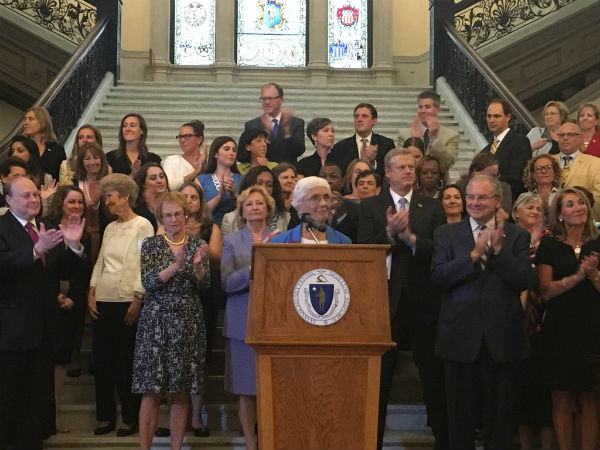Local Senator Lead Sponsor of Successful Pay Equity Legislation
New law prevents wage discrimination on the basis of gender
Governor Charlie Baker signed a bipartisan pay equity bill, passed unanimously by both legislative branches, to ensure equal pay for comparable work for all Massachusetts workers and equal opportunities to earn competitive salaries in the workplace. The Governor was joined by Lt. Governor Karyn Polito, Senate President Stanley Rosenberg, Speaker of the House Robert DeLeo, Treasurer Deb Goldberg, State Auditor Suzanne Bump, State Senator Patricia Jehlen, Representative Ellen Story, Representative Patricia Haddad and members of the Legislature at a signing ceremony in the State House to enact S.2119, An Act to Establish Pay Equity, which will go into effect on July 1, 2018 for Commonwealth employers and employees.
“I am pleased to sign bipartisan legislation to create a more level playing field in the Commonwealth and ensure that everyone has the opportunity to earn a competitive salary for comparable work,†said Governor Charlie Baker. “I thank the Legislature for unanimously passing this bill and working closely with the business community to support women and families across the state.â€
“This legislation is an important step toward advancing more equal, inclusive and thriving workplaces throughout the Commonwealth for women and families,†said Lt. Governor Karyn Polito. “We thank the Legislature for their collaboration with the Commonwealth’s employers and their commitment to creating more opportunities for Massachusetts skilled workforce.â€
The new law will prevent pay discrimination for comparable work based on gender. The bill allows employees to freely discuss their salaries with coworkers, prohibits employers from requiring applicants to provide their salary history before receiving a formal job offer and authorizes the Attorney General to issue regulations interpreting and applying the expanded law.
Under the new law, employers are permitted to take certain attributes of an employee or applicant into account when determining variation in pay, like: their work experience, education, job training, or measurements of production, sales, or revenue.
“This new law is an important step toward ensuring economic security for Massachusetts women and families,†said Attorney General Maura Healey. “It makes vital updates that reflect our modern economy and balance the needs of workers and the business community. We thank the House and Senate for moving this bill forward, especially Speaker DeLeo and Senate President Rosenberg, Ways and Means Chairs Dempsey and Spilka, Speaker Pro Tempore Haddad, Labor and Workforce Chairs Scibak and Wolf, and the bill’s lead sponsors, Representatives Story and Livingstone and Senator Jehlen. We also thank Governor Baker for signing it into law and the many business and advocacy groups who lent their support. Pay equity is not only a women’s issue, it’s a family issue, and with this new law on the books, we are closer to closing the pay gap in our state.â€
“The signing of the Equal Pay bill is a momentous occasion for Massachusetts,†said Treasurer Deb Goldberg. “When women are paid what they are worth, families are stronger, our state is stronger, and our economy thrives.”
“For too many generations women have done equally hard, equally skilled, and equally responsible work as men in the same workplace,†said State Senator Pat Jehlen (D-Somerville, Medford). “This is an important milestone on the journey toward equity for women and families all across this Commonwealth.â€
The statute of limitations laid out currently under the Equal Pay statute will be expanded from one to three years and employees will no longer be required to pursue a general claim of intentional discrimination at the Massachusetts Commission against Discrimination before filing a separate equal pay claim in court.
“This is a historic milestone for the millions of working women in our state who, for generations, have cared for themselves and their families with lower wages than they both needed and deserved,†said Senator Jehlen. “I am so happy for my granddaughters, who will enter a much fairer workforce and won’t have to battle the same gender wage gap that has held back women’s salaries for too long.â€
Senator Jehlen has cosponsored a version of the legislation since 1998, with inspiration for the original bill coming from a group of female cafeteria workers at Everett Public Schools. The employees sued the school district in 1991 after learning they were paid half as much as male janitors at the schools. The cafeteria workers won at the trial court, but the Supreme Judicial Court overturned the decision, ruling that the state’s equal pay law did not clearly define comparable work.
As a result of the 1991 Everett cafeteria workers’ suit, the bill includes a definition of “comparable work†while still maintaining flexibility for performance-based compensation. The bill incentivizes companies to correct compensation disparities internally before going to court by creating three-year affirmative defense from liability. Within that time period employers must complete a self-evaluation of their pay practices and demonstrate reasonable progress in eliminating pay disparities. The bill also prohibits an employer from preventing employees from talking about their salaries.
“This bill finally recognizes that pay inequity is a problem,” said Senator Jehlen. “It doesn’t solve the problem, but it removes many barriers which we know have kept women from achieving equity.â€


– Information from State Senator Jehlen’s office and Governor Baker’s office. Photos courtesy Sen. Jehlen.